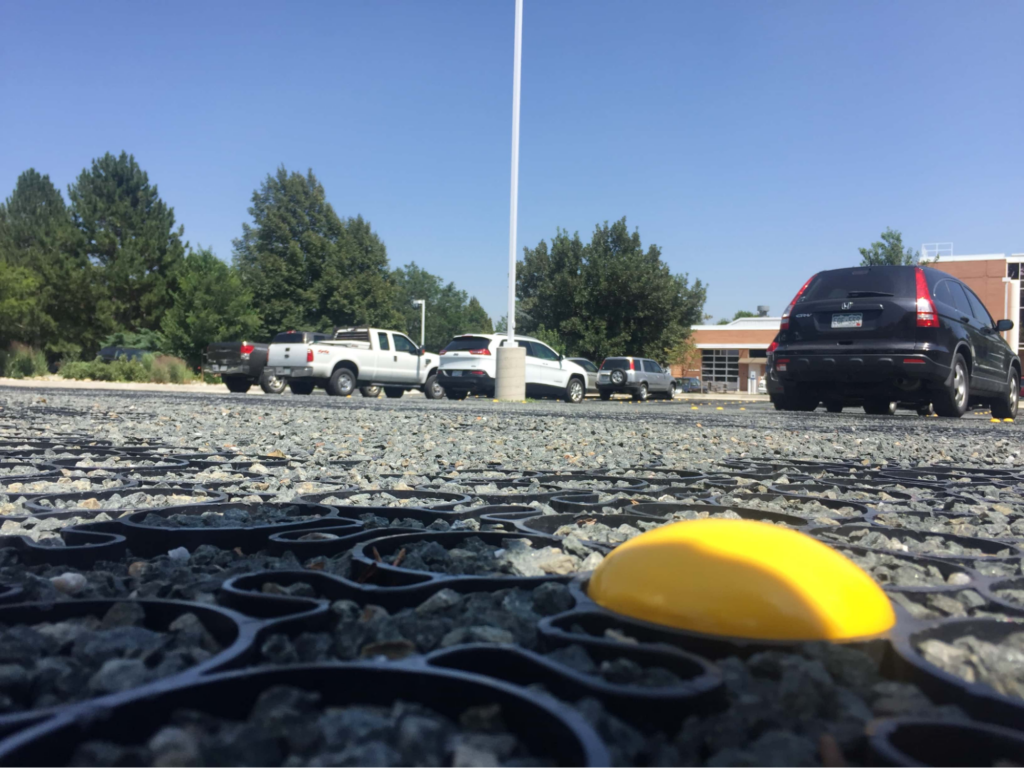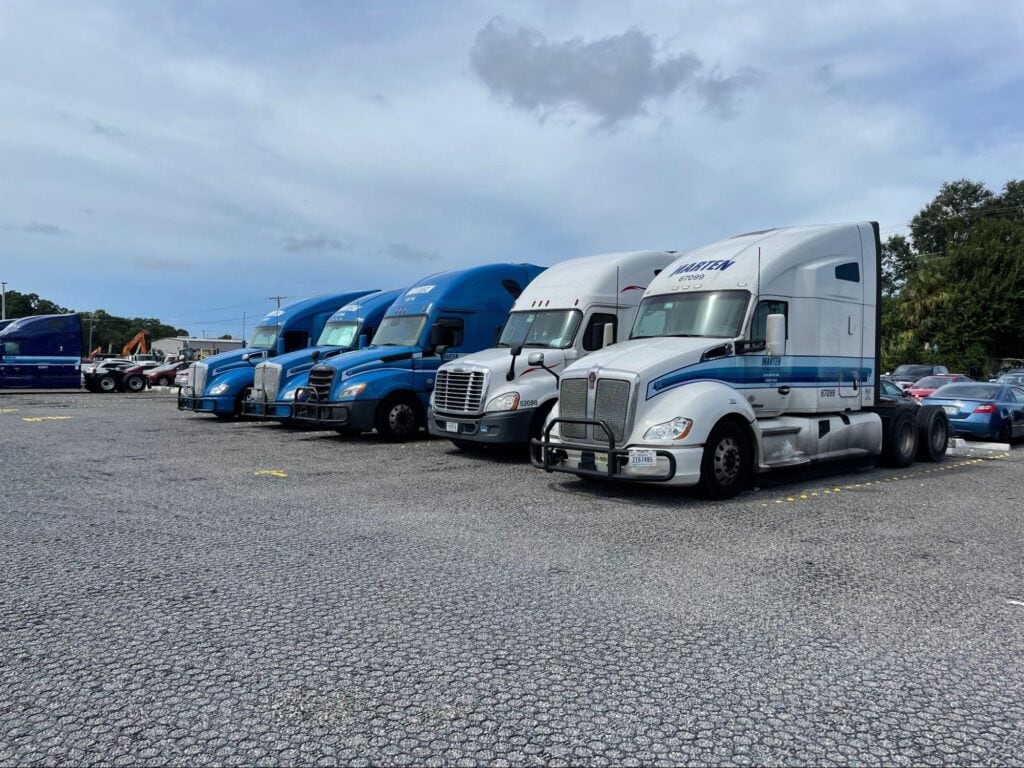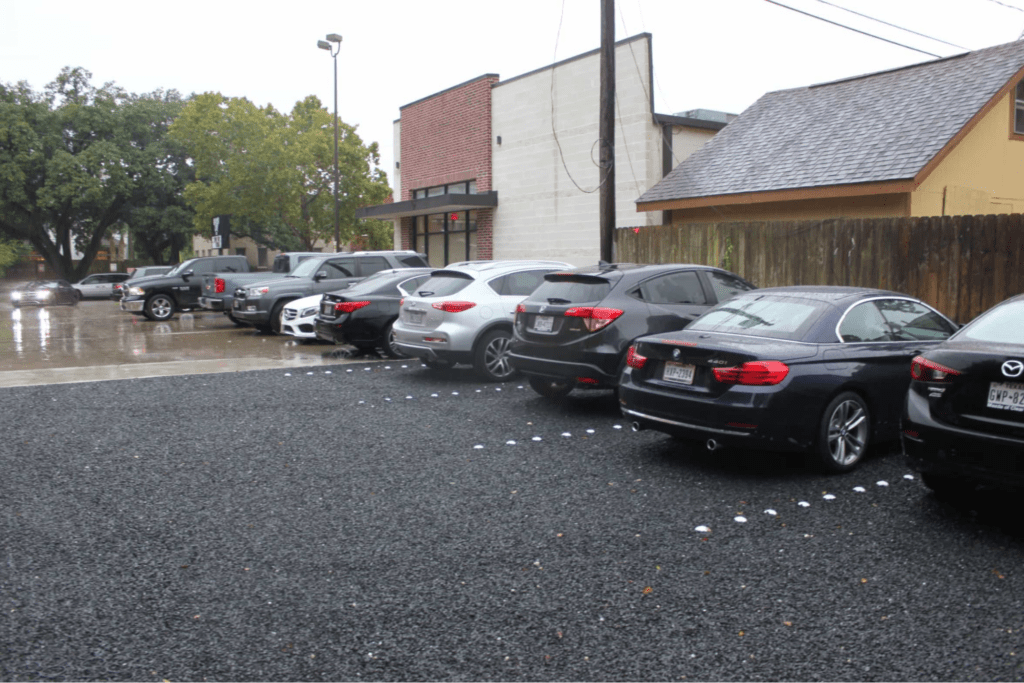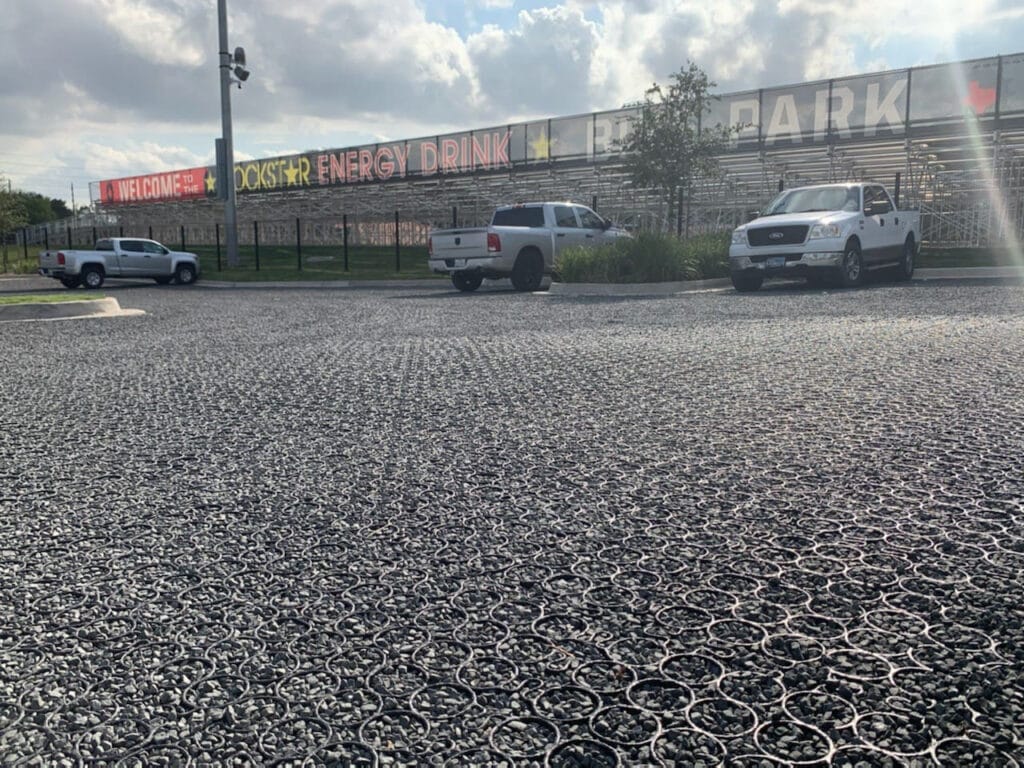Concrete Puddling: Understanding the Issue and Finding the Right Solutions

There are few worse ways to start your day than pulling into work in the morning and opening the car door only to find yourself surrounded by water from last night’s rain storm. You try to jump from your car to the lone visible dry spot, but you don’t make it, not even close. You now have to spend the rest of the day with cold, damp feet; happy Monday.
What causes concrete puddling after a storm? Why are there low spots? Why doesn’t the water drain? Could these puddles indicate some underlying problems with the parking lot structure? It turns out there might be more to puddles than you think.
Are Puddles in Your Parking Lot a Bad Thing?
The short answer is yes; puddles are not ideal.
Besides being a tremendous pain for you, your customers, patrons, tenants, or anyone else using your parking lot, standing water can cause damage, indicate subsurface problems, and be unsafe.
What Causes Puddles to Form in Parking Lots?

Aside from the obvious answer being rain, many things may be causing the concrete to puddle in your parking lot. From heavy traffic to poor drainage and improper installation, there are more possible causes for your puddling than you may realize.
Rutting
Rutting is more common on unimproved dirt roads, unplowed snowy roads, and poorly installed gravel, but it can also happen in asphalt.
Rutting can occur due to an improper mix of asphalt materials. The asphalt mixture can compress over time and heavy use to create disappointing ruts in your parking lot that pool water when it rains.
Rutting can also commonly occur due to pre-existing ruts in the subgrade.
The subgrade to a parking lot is layers of compacted gravel, crushed stone, and sometimes sand. The subgrade is what the asphalt layer of your parking lot is poured on top of.
Sometimes, when pre-existing ruts exist in the subgrade, the asphalt will settle, which affects the surface of the road or parking lot.
Raveling

Raveling is another result of an improper asphalt mixture.
Raveling happens when the bond between asphalt’s aggregates and polymers or binding agents is broken. The broken bond results in a loose gravel and sediment layer on top of your asphalt. The loss of top-layer aggregates in asphalt results in dimples and divots where water can accumulate. This thin pooling of water on top of your asphalt and the layer of loose gravel and sand can create a potential hazard for loss of traction and hydroplaning.
Heavy Vehicle Traffic
Unfortunately, even correctly mixed and installed asphalt will break down and wear over time. Consistent vehicle traffic, especially if your parking lot is frequented by heavier vehicles like trucks, RVs, or commercial construction equipment, can significantly affect your parking lot over time.
Poor Drainage
A common culprit in forming parking lot puddles, poor drainage is often to blame for concrete puddling.
Although most parking lots should be built with a slight pitch to avoid standing water, it is often not enough. Many parking lots and parking garages require additional drainage. This additional drainage can be in the form of:
- Catch basins
- Trench drains
- French drains
These drainage options should help reduce standing water in your parking area, but they can also be the culprit.
All of the above styles of drains are susceptible to clogging, which can result in significant pooling and puddling. These types of drains require regular maintenance in order to work correctly and efficiently.
Using Permeable Pavers to Eliminate Puddling in Your Parking Lot

Permeable pavers are rapidly becoming a popular way to eliminate puddles from your parking lot.
Permeable pavers are 100% pervious plastic interlocking grids that you fill with gravel or allow grass to grow through. The paver’s plastic grid structure gives it considerable compressive strength, and its open, porous nature allows water to pass through freely, to eliminate puddles completely.
With permeable pavers, you never need to worry about ruts, raveling, heavy vehicle traffic, or drainage. The compressive strength of the pavers prevents ruts from forming, regardless of vehicle weight or traffic. The natural surface and superior drainage eliminate raveling and drainage issues completely.
Traditional asphalt all looks the same, but permeable pavers allow you to choose between either a gravel or grass surface.
Gravel
The interlocking pavers secure gravel firmly in place, so the rutting and spilling traditionally associated with gravel parking lots are eliminated with permeable pavers.
Unlike traditional asphalt, a reinforced gravel parking lot is virtually maintenance-free and will never crack or heave.
Grass
Grass parking lots create a beautiful emerald ambiance, but have always been plagued by mud, ruts, and grass being killed by vehicle weight.
By reinforcing the soil with permeable pavers, the traditional flaws of a grass parking lot are a thing of the past.
The permeable paver’s plastic grid protects delicate roots from being crushed, eliminates ruts, and keeps mud contained.
Choose TRUEGRID Permeable Pavers to Ensure Proper Drainage for Your Commercial and Residential Projects

Concrete and asphalt are impervious to moisture, which can be an environmental and logistical nightmare when building parking lots, roads, patios, and walkways. What if there was a better way?
Founded in 2013, TRUEGRID is dedicated to creating durable, practical, and environmentally-conscious paving alternatives.
TRUEGRID manufactures its permeable pavers 100% in the USA from 100% post-consumer recycled PPE, which saves millions of pounds of plastic from our landfills and oceans.
TRUEGRID’s full line of products can accommodate projects of any size and requirements. From the industry-leading strength of the PRO PLUS to the lighter-duty versatility of the PRO LITE, TRUEGRID can help you build heavy-duty semi-truck parking lots or residential patios and walkways.
Contact TRUEGRID today, or get a free online estimate and learn how TRUEGRID can be true to your project and true to the environment.

Semi-trailer trucks are the blue whales or elephants of the open road, the respective largest animal in its ecosystem.
Unlike standard passenger vehicles, the sheer size of a semi-truck means that specific accommodations have to be made.
In the same way that we created drawbridges to accommodate the passing of large ships and oil tankers, trucks also require a specific infrastructure to accommodate their substantial size. For example, overpasses, bridges, and tunnels all need to be built at a minimum height to allow for safe truck passage, otherwise there could be costly damage and logistical nightmares.
Parking spaces are no different. Unlike the quaint little parking spots used for passenger vehicles, semi-trucks require much larger areas for safe parking.
Do Trucks Need Bigger Parking Spaces?
The short answer is yes; trucks need bigger parking spaces than standard commuter vehicles.
In addition to the considerable length and girth of the truck itself, most of the time, there is a trailer to take into consideration as well. The average length of a truck and trailer is about seventy feet, with the width measuring about eight and a half feet.
Compare this massive size to the standard size of an SUV, a little over six feet wide and sixteen feet long, and it is easy to see why a semi-truck needs a larger parking space.
What Are Standard Truck Parking Space Sizes?

Truck parking spaces are much larger than passenger vehicle parking spaces, which, on average, measure between a diminutive eight feet wide and eighteen feet long.
Parking spots for semi-trucks must be at least a whopping fifty-five feet long by fourteen feet wide. A parking spot for a semi-truck with an attached trailer needs to measure a colossal seventy-five feet long by fourteen feet wide.
Other Considerations for Truck Parking

In addition to the impressive size of the parking spaces, semi-trucks require some other special considerations in parking areas:
- Truck turning radius
- Parking lot layout
- Backup and pullout space
These are all things that you need to consider when building semi-truck parking.
Using Permeable Pavers for Truck Parking Lots

Permeable pavers, like TRUEGRID PRO PLUS, are a great alternative to concrete or asphalt truck parking lots.
Made from plastic, permeable pavers are interlocking grids that allow grass to grow through them or gravel to fill them. They are 100% pervious, meaning water can flow freely and naturally through the paver and into the ground.
Permeable pavers are engineered with impressive compressive strength; TRUEGRID PRO PLUS, for example, is H20 and HS20+ rated. These ratings mean that TRUEGRID PRO PLUS can handle two-axle or more than two-axle vehicles with an axle loading of 32,000 pounds.
In addition to their substantial strength, permeable pavers are easy to install and immune to many problems that plague concrete and asphalt.
Permeable pavers don’t crack and require minimal maintenance. Standard asphalt parking lots are often susceptible to pooling and puddling after storms, but permeable pavers naturally drain across 100% of their surface area. There is no need for pesky catch basins and drains that clog and flood with permeable pavers.
In addition to high strength, low maintenance, and easy installation, TRUEGRID PRO PLUS pavers are eco-friendly as well. Made from 100% post-consumer recycled PPE, TRUEGRID pavers have saved millions of pounds of plastic from entering landfills and oceans, and their pervious surface has returned millions of gallons of stormwater to the ground.
Gravel

Once installed, permeable pavers are filled with either gravel or grass.
Gravel has a significant advantage for truck parking due to its extremely low maintenance.
Unlike standard gravel surfaces that develop ruts and spill gravel onto adjacent roads and lawns, permeable pavers provide a structure to hold every last stone in place. This means absolutely no ruts and no spillage.
Unlike asphalt, which requires resurfacing, permeable pavers filled with gravel need virtually no maintenance and help meet many environmental standards as well.
Grass
An increasingly popular parking surface, grass creates an incredibly eco-friendly parking area with a pleasing natural look.
Non-reinforced grass fields and lawns are highly susceptible to rutting and becoming unmanageable mud pits, however stabilizing the soil with permeable pavers completely eliminates these problems.
By providing reinforcement, permeable pavers eliminate ruts, mud and protect fragile roots from being crushed by driving, and will create a near-invincible grass surface.
Choose TRUEGRID for Eco-Friendly, Low Maintenance Truck Parking
Founded in 2013, TRUEGRID set out to create practical and robust paving alternatives that could not only compare to traditional asphalt and concrete, but also surpass them with flying colors.
Creating products from 100% post-consumer recycled PPE and manufacturing them 100% in the USA, TRUEGRID has prevented millions of pounds of plastics from entering landfills and contaminating water supplies.
With their entire line of products, including the PRO LITE, PRO PLUS, and ROOT, TRUEGRID has products for everything from residential walkways to commercial parking lots and roads.
Want to learn how to use TRUEGRID for your home or commercial project? Visit their site, reach out today, or get a free online estimate from the comfort of your own home and find out how TRUEGRID can be true to your project and true to the environment!

We’ve all been there; you pull into the parking lot of a local business only to step out into an ankle-deep puddle, soaking your foot and ruining the rest of your day. Don’t let your commercial real estate fall victim to the same fate, plan ahead and implement commercial parking lot drainage systems.
When constructing a commercial building project, there can be a seemingly endless supply of details, decisions, and red tape. While these hurdles can be daunting, keeping components like commercial parking lot drainage systems at the front of your mind will save your future self a lot of headaches.
So what are the best commercial parking lot drainage systems and solutions? Keep reading to find out.
Catch Basins

The catch basin is one of the most common commercial parking lot drainage systems.
Typically made from plastic, a catch basin is an open-topped box installed just below grade with a grate for a lid that sits flush with the finished asphalt or concrete floor. The finished parking lot floor should be pitched toward the grate, to allow water to flow into the basin below and away from the parking lot through a series of drainage pipes.
Although catch basins are a very widely implemented commercial parking lot drainage system, they thrive in scenarios that do not see substantial rainfall or non revenue water runoff.
The limited size of a catch basin reduces its capacity to handle large volumes of water. They are notorious for becoming clogged with debris like sediment and leaves, and they require a lot of maintenance.
Concrete-Encased Drainage Basins
Concrete-encased drainage basins are constructed similarly to catch basins, but are built out of concrete.
The advantages of using concrete-encased catch basins are:
- Increased capacity to handle larger amounts of water
- More rugged and durable construction.
A commercial parking lot drainage system is a substantial improvement over a standard catch basin, but they still have clogging issues and the potential to be overpowered by large quantities of precipitation.
Trench Drains

Another popular commercial parking lot drainage system is the trench drain.
Trench drains are long, narrow plastic or metal catch systems installed below grade with a grate covering the top. The concrete or asphalt parking lot floor is pitched toward the trench, which pours water into your drainage system.
Trench drains can handle a larger volume of water than catch basins, but they often have similar clogging issues; if a trench drain becomes clogged, it is utterly useless.
French Drains
A french drain is a style of commercial parking lot drainage system that embeds a perforated pipe or tube beneath grade, that is typically covered with a permeable material like gravel or crushed stone.
A good french drain will cover the permeable pipe in a mesh sock or sleeve that helps to prevent sediment and other debris from clogging the drain. Unfortunately, the fabric itself can often become saturated with a fine layer of silt, which makes it impervious.
Permeable Pavers

Permeable pavers, like TRUEGRID PRO PLUS, are an incredible commercial parking lot drainage system that provides unmatched drainage while maintaining the compressive strength and durability required for a high-traffic parking area.
Unlike traditional parking lots made of concrete or asphalt, TRUEGRID PRO PLUS lets you use grass or gravel as your parking surface. These naturally porous surfaces create a parking lot that will drain naturally over its entire surface area without risk of clogs.
Grass
Creating a grass commercial parking lot makes a unique visual statement and a naturally draining, environmentally-friendly space among the sea of concrete. TRUEGRID PRO PLUS allows grass to grow and thrive, and protects its delicate roots from crushing with their 100% post-consumer recycled PPE, 100% Made in the USA plastic grid.
Gravel

Creating a commercial parking lot from TRUEGRID PRO PLUS and gravel provides a virtually maintenance-free parking lot.
Unlike typical gravel parking lots that suffer from rutting and spilling, the TRUEGRID PRO PLUS keeps gravel firmly in place and eliminates rutting. By creating an entire parking lot out of gravel, you can all but guarantee that you will not have any drainage issues because the whole lot is naturally permeable.
Solve Your Commercial Parking Lot Drainage Problems with TRUEGRID
Founded in 2013, TRUEGRID permeable pavers are 100% Made in the USA from 100% post-consumer recycled PPE. TRUEGRID permeable pavers have been installed across the world, to provide environmentally-friendly natural drainage for residential and commercial projects alike, in addition to preventing millions of pounds of plastic being dumped in landfills and oceans,
The TRUEGRID PRO PLUS is a permeable paver specifically developed to handle the unique rigors of commercial parking lots. The PRO PLUS is 100% permeable, easy to install, and virtually maintenance-free.
Boasting industry-leading strength, the PRO PLUS is engineered for heavy use providing H20, and HS20+ rated strength.
Contact TRUEGRID today, or get a free online quote for your project today, and find out how TRUEGRID is true to your project and true to the environment.

